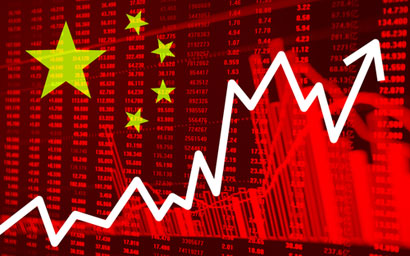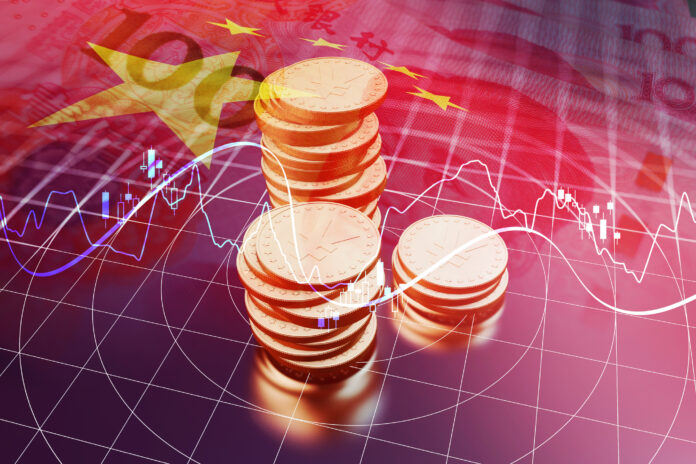Growth may be stalling right now, but as long as geopolitics do not deteriorate further, China is theoretically a “pretty interesting place” to invest, David Blackman hears.
For much of the past month, the eyes of the world have been on China, where the ruling Communist Party has been holding its 20th five-yearly party congress in Beijing.
However, the economic backdrop to the congress has not been as favourable as Xi Jinping, whose appointment for a third five-year term as Communist party general secretary was due to be rubber-stamped after this article went to press, would have liked for the party’s showpiece centenary event.
While the rest of the world reeled from the Covid-19 pandemic during 2020 and 2021, the Chinese economy recorded a “very strong performance”, says Nicholas McConway, head of Asia at Amundi.
US Treasury monitoring figures for foreign securities showed a “steady increase” in allocations to Chinese equities in 2020 and 2021, says Jason Paltrowitz, director, corporate services, at the OTC Markets share trading platform.
Growth was so strong that last year, the Chinese government adopted a more interventionist approach to the economy, tightening the regulation of powerful technology platforms such as Alibaba. And in a bid to reduce social inequalities, the hitherto booming K-12 private secondary school market was effectively shut down, prompting question marks among some outside investors about China’s legal and political safeguards.
However, growth began to slow down in the third quarter of 2021 as financial problems emerged at the heavily indebted property developer Evergrande.
“On a year-on-year basis, consumption is barely growing in china, which is really quite poor.”
With home prices falling and many housing construction projects stalling, an increasing number of property owners have refused to pay mortgages on properties that have yet to be completed.
Property investment across China contracted by 13.9% year-on-year in August, according to official statistics.
An overhang of unsold flats in the real estate market, which makes up around a fifth of the Chinese economy, has had a knock-on impact on the many ancillary businesses, says McConway.
Company earnings were already suffering in the final quarter of last year before the coronavirus pandemic, which had first emerged in China, really caught up with the country, he says.
“You had all of these guys pulling back their spending, you had a consumption slowdown, a cyclical slowdown, a corporate investment slowdown and then coming into this year, Omicron really just put the boot in. Omicron came along in Q1, and the numbers didn’t recover. We’re in this unique situation where pretty much anything that could go wrong has gone wrong.”
Suboptimal stabilisation
The lockdowns, the most important of which hit the Chinese commercial capital Shanghai during March and April, have eased. But the ongoing risk of lockdowns resulting from the Chinese government’s strict zero-Covid policy has contributed to a stalling of the Chinese economy, McConway says. “The escape velocity isn’t that fast, and we’ve stabilised at a suboptimal level.”
July saw the official manufacturing Purchasing Managers’ Index (PMI) fall to 49.0 from 50.2 in June, indicating a contraction in activity.
This “disappointing” score shows that the recent reopening-related economic recovery has started to falter, Kristina Hooper, global market strategist at Invesco, wrote in a recent note.
The impact of tightened Covid restrictions can also be seen in the 18.2% drop in the number of tourists during early October’s seven-day ‘Golden Week’ national holiday season.
“On a year-on-year basis, consumption is barely growing in China, which is really quite poor,” McConway says.
The Chinese government has responded to these economic headwinds by easing policy. The People’s Bank of China has launched a succession of cuts to its five-year loan rates, which is the benchmark for mortgage payments.
“I always contend that americans love the idea of ‘made in america’ until they go to the store and buy a three-pack of t-shirts, and it’s gone from $2 to $17.”
The majority state-owned bank also recently launched a special lending programme to help developers complete projects which have been sold but are unfinished.
“In all the years I’ve been covering China, I’ve never seen so much proactive easing,” says McConway, adding that this policy easing has been accompanied by a renewed infrastructure push.
Most analysts are predicting lower growth than investors have been used to seeing in China, which has been the powerhouse of the world economy since the country began opening up in the 1980s. Christoph Siepmann, a senior economist at Generali, has recently cut the firm’s 2022 growth forecast for China to 2.7%, albeit rebounding to 5.1% next year. Amundi’s most recent 2022 estimate, meanwhile, is 3.2%.
These are “pretty anaemic” growth figures for China, says McConway. “This is not really where it should be.
“We’re looking at some of the slowest growth in China that we’ve ever seen.”
Amundi’s own China fund saw “very weak” inflows during the first quarter of this year, which then picked up during the next three months, he adds.
This year has seen a selloff of Chinese equities on the OTC platform, says Paltrowitz. “As we look into this year, it doesn’t appear to be a huge pull-out per se, but like everything else, there’s a selloff in the market.”
Index trackers
He is unsure to what extent this reflects wider bearishness in the market or worries about the Chinese economy in particular. While there is a “tremendous amount of money” in Chinese equities, much of it is in index tracker funds, says Paltrowitz. “As long as China is in those indices and you have access to those equities, that’s going to continue.”
However, a significant chunk of the money in Chinese equities has been self-directed, or DIY, investment, he says. “A lot of the money that went into these Chinese companies was people taking a view that China was the future.
“All through the 2000s and into this decade, there was a lot of self-directed money going into Chinese companies from nano cap right up to mega cap.”
 Given wider inflation and recession risk concerns, these DIY investors are likely to opt for safer havens, Paltrowitz says. “We’ll probably see a lot of pullback out of China. I wouldn’t expect a lot of self-directed money in the next couple of years. I would think China would be a little risky.”
Given wider inflation and recession risk concerns, these DIY investors are likely to opt for safer havens, Paltrowitz says. “We’ll probably see a lot of pullback out of China. I wouldn’t expect a lot of self-directed money in the next couple of years. I would think China would be a little risky.”
Such perceptions will inevitably be coloured by wider geopolitical strains, particularly between the US and Chinese governments. US president Joe Biden has set a goal of reshoring production of potentially strategic technologies, like semiconductors.
There will be limits to consumers shunning cheap Chinese goods, though, suspects Paltrowitz. “If we really are going to onshore a lot of this stuff, that’s going to hurt the Chinese. But I always contend that Americans love the idea of Made in America until they go to the store to buy a three-pack of T-shirts, and it’s gone from $2 to $17.”
If China were to take a big gamble, like prosecuting its One China policy by invading Taiwan, for example, the picture would change, says McConway. “Geopolitics is critical. If China becomes uninvestable because of the path that it takes on some geopolitical issues, then that’s obviously very important.”
Despite much sabre-rattling in recent months, he sees little likelihood that this will happen. “The one thing China has been for many, many years is pragmatic. The cost to China of doing something on that One China policy would be pretty huge. Even if a bad decision was made, it could have a huge impact – but that’s highly unlikely at this point in time.”
Exports “off the charts”
For now, at least, the geopolitical tensions between China and the West are likely to hit the country’s growth in five or ten years rather than now, McConway believes.
These tensions haven’t impeded Chinese export growth, he says. “Geopolitics has a pretty large impact on sentiment, but if you look at the fundamentals of China’s trade balance, it’s been off the charts.”
And while geopolitical tensions don’t help market sentiment towards China, such tensions have been outpaced by investors’ growing experience of the country, says Paltrowitz. “We are seeing more geopolitical tensions between the West and China, but on the other hand, as time goes on, investors are probably going to be more comfortable with the Chinese market.”
“As long as the geopolitics doesn’t deterioriate even more, which you could argue would be hard, then china is theoretically a pretty interesting place to invest right now.”
These tensions mean China is increasingly viewed as a distinct asset sub-class rather than being lumped in with other emerging market economies, he says. “It’s developed its own identity, and I think a large part of that is the politics. People perceive political risks associated with China, which they don’t necessarily perceive with the broad universe of emerging markets. Turkey is an emerging market with political risk, but I think people view China and Turkey completely differently.”
And the sheer size of the Chinese economy, which is already the world’s biggest and on course to overtake the USA’s, also means that it dwarfs other emerging markets, says McConway.
However, with Chinese companies’ earnings in a trough, this is a good time to invest, he says. “As long as the geopolitics doesn’t deteriorate even more, which you could argue would be hard, then China is theoretically a pretty interesting place to invest right now.”
© 2022 funds europe





